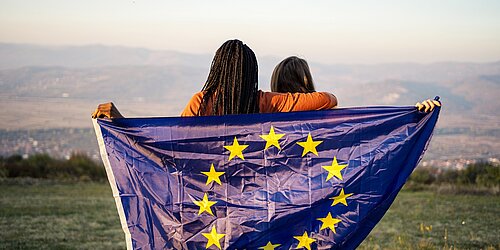Copyright: Shutterstock/Oasishifi
Project background
The transformation to a circular economy is a prerequisite for anthropogenic resource consumption within planetary boundaries and holds great opportunities for a socio-ecological economic model.
An important lever for implementing a circular economy is digitalization: It allows better networking of machines and systems to make material inputs more efficient and to enable the sharing economy, e.g., via digital platforms and software solutions. Nevertheless, digitalization also poses new challenges for the circular economy: Rebound effects as well as the material basis of digitalization itself could negatively impact raw material and other resource consumption by increasing their demand. At the same time, digitalization could promote increasing market concentration in different sectors and thus stand in the way of a socially inclusive design of the circular economy.
Various political processes are currently under way at the European Union (EU) level that will be decisive for the future framework of digitalization as well as an effective design of the circular economy: With the Circular Economy Action Plan (CEAP), the EU Commission has presented an ambitious package of measures for the implementation of a Europe-wide circular economy, which will need to be further concretized and implemented in the coming years. In parallel, at the end of 2020, the EU Commission presented three legislative proposals for regulating current digital developments: the Data Governance Act, the Digital Services Act and the Digital Markets Act. These policy processes address a common set of political objectives. Unfortunately, only insufficient cross-references in the scope of circular economy and digitalization policies can currently be identified. Thus, there is a risk that valuable synergies remain unrecognized or that processes negatively influence each other.
Project goals and measures
The project will follow an approach based on inputs from stakeholders from policy making, civil society, business and research to develop policy proposals to enhance the coherence of the measures and to ensure effective implementation of the circular economy action plan against the backdrop of digitalization. The implementation of a consistent circular economy and the alignment of digitalisation with sustainability goals is an important prerequisite for the transformation to a climate-neutral eco-nomic system.
To this end, the different political processes and economic developments at EU level will be analysed in regard to their impact and coherence. These findings will be reflected and further elaborated in dialogue with stakeholders following a stakeholder-based science approach. On this basis, policy recommendations for circular economy and resource reduction will be developed. The results of the project will be fed into social and political debates through active public relations and press work as well as targeted advocacy work of the project.
